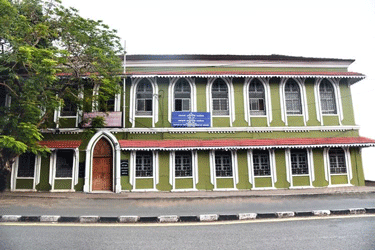Goa is abuzz with excitement as vintage bike and car owners, users, collectors and fans are decking […]

INFOSYS MESS UP NEW INCOME-TAX SITE!
In the News, June 12- June 18, 2021 June 11, 2021COMPLICATED: Instead of making life simpler for the tax-payer the new website for the benefit of those who wish to pay their taxes online, appears to have crashed. Even chartered accountants are not able to access this aam aadmi friendly site.
By Arvind Pinto
The new simplified Income-Tax site which commenced on June1 for online filing of taxes has not been accessible to tax-payers. The new website was supposed to be much simpler than the earlier website to enable middle class income-tax payers to file their returns without the help of chartered accountants.
THE Income-Tax Department is now wearing a new face. It has come up with a new e-filing website. While the site is not yet operational at the time of writing this article several of the features of the new website are already making the news.
As per the information available the new website would be of benefit to its users. In the first place it would be user-friendly. It will have a single dashboard for all pending matters. This will enable users to see what matters are pending and take these up on a priority basis. Further, for the filing of their returns, there is an interactive software that will make it easy for a layperson to file his or her returns. Much of the details of their income, such as salary income, bank interest and dividend, as also the tax deducted thereon, will be pre-filled, making it easy for an assesse, since one will not have to go to the AS26 site, where income and tax deductions are listed.
Reportedly, the new site was to be launched on June 7, 2021. Till date the site is not operational and a news item informs that Finance Minister Nirmala Sitharaman has spoken to Infosys which has set up the new income-tax site regarding the issue. Hopefully it will be operational soon, since the date for filing of advance tax for the current financial year is June 15, 2021.
One of the earlier grievances of a majority of tax-payers was that they would rarely get their refunds. Earlier, with the manual system of the issue of refunds, one required to know someone in the Income-Tax Office to ensure their refunds were issued. Today, refunds are issued as a matter of course. Refunds are issued directly to one’s bank account and the question of the refund being lost in transit or being returned to the office does not arise.
The new system promises to reduce the delay in the issue of refunds. This, for the common man will be a big benefit. For one of the most common complaint against the Income-Tax Department was that refunds were never issued on time!
FACELESS, IMPERSONAL
FURTHER, another source of complaints was regarding the selection of cases for scrutiny or a detailed investigation. Today, the parameters for the selection of cases for scrutiny are issued by a public circular. Further the cases are no longer manually selected, but selected by computer and the names of these assesses are set well in advance to the assessing officers for the issue of notices.
Another issue of complaints was the nature of the assessment procedure, the personalized manner in which these were done and the consequent corrupt practices that were associated with the process. The government has cut the Gordian knot by making the entire assessment proceedings faceless and impersonal. The entire process of distribution of cases for assessment is computer driven. Therefore, an assessee is not aware of the officer who does the assessment, nor is the assessing officer aware of whose assessment he is processing. All notices are issued by a Central authority that receives the replies and sends both the notices and the replies to an assessing officer. The officer on the basis of the notice and the reply then assesses the income by passing a speaking order. There is a system of a review of these orders to ensure that they are passed in accordance with law and on the facts of the case.
I had occasion to speak with an income-tax officer who was engaged in passing these assessment orders. He did mention that he is happy with the system. The assessing officers do not have any assessee before them. They merely study the information that is put to them and on the basis of the information pass their orders.
The scheme of faceless assessment has been so successful that the system has also been extended to faceless first appeals. Here again a Centralized system sends notices and receives replies. These are then sent on a random basis to an Appellate Commissioner, who on the basis of the information passes an appellate order. It is proposed that this system will also be extended to the Income Tax Appellate Tribunal.
While the system of faceless assessments and appeals, have their positive positions, such as digital efficiency, cutting down on paper and files being misplaced, the apprehension of personal prejudices and corrupt practices, there are several minus features associated with the project. The assessment of income and its consequent appeal, require an understanding of the nature of a particular business or profession, the reasons as to why a particular transaction was undertaken, the fine distinction between revenue and capital, the necessity of a particular expenditure. Often this is best put across during a face-to-face meeting and advocacy by the assessee and his representative has an advantage of putting across points of view and answering queries when both the officer and the assessee are before each other.
POSITIVE SIDE
THE present procedure is still in its infancy and its system is still undergoing refinement. Fortunately, complicated assessment and appeals such as search cases, international taxation cases are still conducted in a face-to-face manner.
On the positive side, this system of faceless assessments and appeals will result in a more professional and fact base assessments. Since there is no human interface the allegations of corruption and personal prejudice would not hold water. Further there is time saving since the officers would be given all the inputs from a Centralized system. Further these assessments would be vetted before they are issued, by the supervisory authorities to ensure that they are based on both the facts presented as also by extant law. With assessments being transmitted digitally, the question of papers being lost in service or post would be a thing of the past. Further with the records being held digitally, there would always be on cloud for verification.
However, the system of faceless assessment and appeals is not without its drawbacks. Earlier presenting a case before the Assessing Officer or Appellate Commissioner, an assessee had the ability to present different points of view and would be able to effectively counter any questions that were asked. This would now not be possible, since neither the assessee nor his representative is before the adjudicating authority.
Probably over time, both the department and the assesses would be able to evaluate both the pros and cons of the system. After this system is operational it would be of use to determine whether it has enhanced revenue collection. For the goal of assessment of income is to ensure that taxes are collected. With the fiscal deficit at 9.5 percent of the GDP there is an urgent need to collect every penny that is due to government!















